Asylum seekers entering the UK are attempting to claim benefit payments in both Ireland and Britain, it has emerged.
Afghanistan asylum seeker Zafar had travelled across mainland Europe to France before making the channel crossing to the UK, applying for asylum status on June 16.
But on July 19, he boarded a flight from Manchester to Belfast, despite UK immigration officials advising him avoid leaving the country prior to his case being processed, The Times has reported.
Irish police officers believed that Zafar had planned to lodge an additional benefits application in Ireland.
As a result, he failed to reach the International Protection Office (IPO) in Dublin. Garda National Immigration Bureau (GNIB) officers stopped him at the border.
Having been escorted off a bus along the M1 motorway between Belfast and Dublin, Zafar revealed that he possessed a UK asylum application registration card.
He was returned back to the UK that day as part of the GNIB’s 71st ‘day of action’ under ‘Operation Sonnet’, which seeks to clamp down on illegal immigrants seeking to cross the Irish border.
One of the nine officers who oversaw the return of Zafar that day told the Times that he believed Zafar was ‘most likely going to claim asylum’ in Dublin in a bid to collect benefits from both nations.
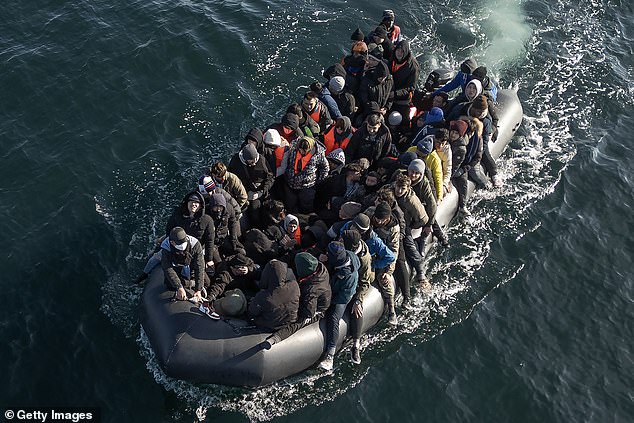
Asylum seekers entering the UK are attempting to claim benefit payments in both Ireland and Britain, it has emerged (Pictured: migrants cross the English Channel in March 2024)
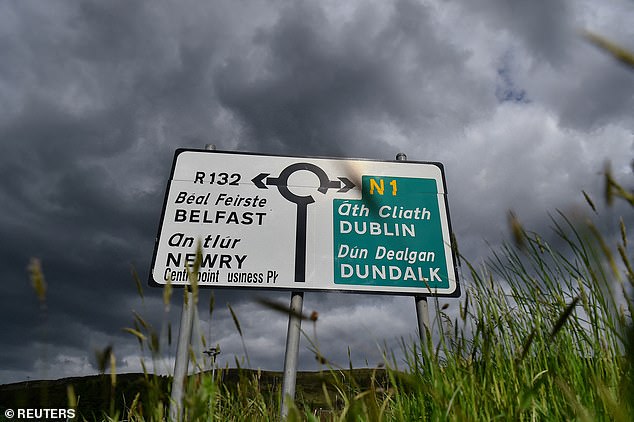
Afghanistan asylum seeker Zafar applied for UK asylum status on June 16. But on July 19, he boarded a flight from Manchester to Belfast, The Times has reported. Irish police officers believed that Zafar had planned to lodge an additional benefits application in Ireland (file image)
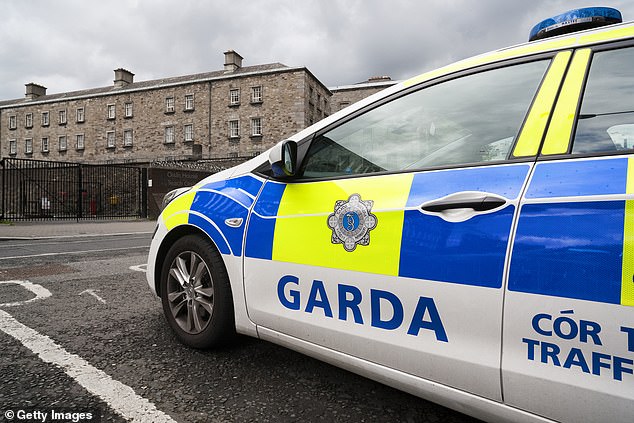
Zafar was returned under the GNIB’s ‘Operation Sonnet’, which seeks to clamp down on illegal immigrants seeking to cross the Irish border. In 2019, the UK and Ireland agreed to protect the Common Travel Area, permitting the immediate return of asylum seekers
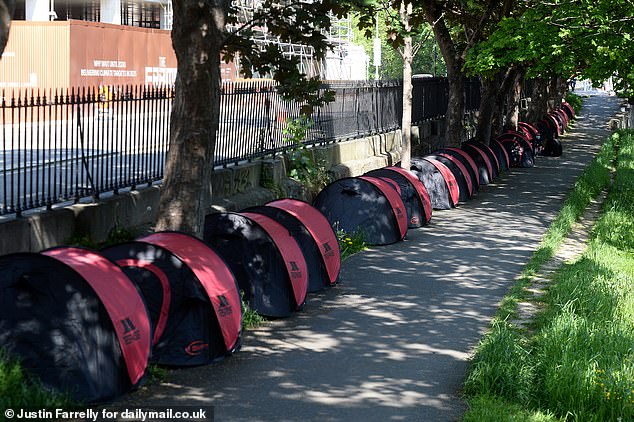
Pictured: asylum seekers pitched up tents along Dublin’s Grand Canal in May 2024 as part of a makeshift camp
Adding that the incident is something officers ‘see all the time’, he said that Zafar was just one of eight men detained by the Gardai during inspections of 12 buses that day.
Inquiries into another asylum seeker removed from a bus, named Hassan, revealed that he had applied for British refugee status and was working in the UK while visiting Ireland weekly to collect welfare funds.
Speaking to The Times, an officer assured that the Pakistani national, who had initially told Irish officers he was from Afghanistan, would now be ‘cut off’ and returned back to Britain.
In 2019, the UK and Ireland agreed to protect the Common Travel Area, permitting the immediate return of asylum seekers who arrive in Ireland after being in the UK, and vice versa.
Under Operation Gull, the UK seeks to target migrants that attempt to use Ireland as an entry route into Britain via Northern Ireland.
Last year, then Irish justice minister Helen McEntee told a scrutiny committee in the Irish Parliament that more than eight in ten asylum seekers in the Republic of Ireland have crossed the country from Northern Ireland.
Speaking at the Oireachtas committee on April 23, she claimed that more than 80 per cent of people seeking asylum here entered the country through the North.
‘I’d say it’s higher than 80 per cent,’ Ms McEntee said, in response to questions from Fianna Fáil senator Robbie Gallagher. ‘That’s particularly worrying,’ he responded.
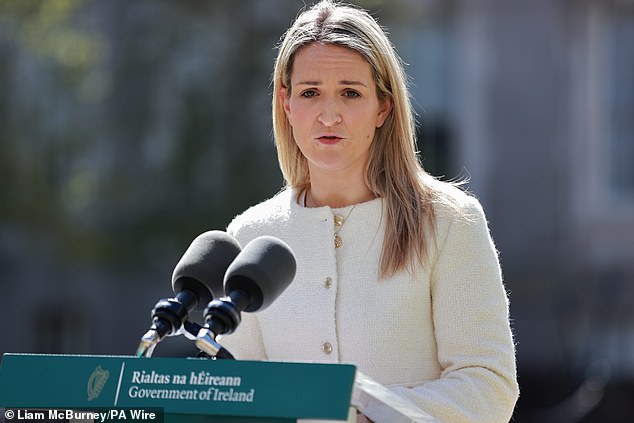
Last year, then Irish justice minister Helen McEntee (pictured) told a scrutiny committee in the Irish Parliament that more than eight in ten asylum seekers in the Republic of Ireland have crossed the country from Northern Ireland
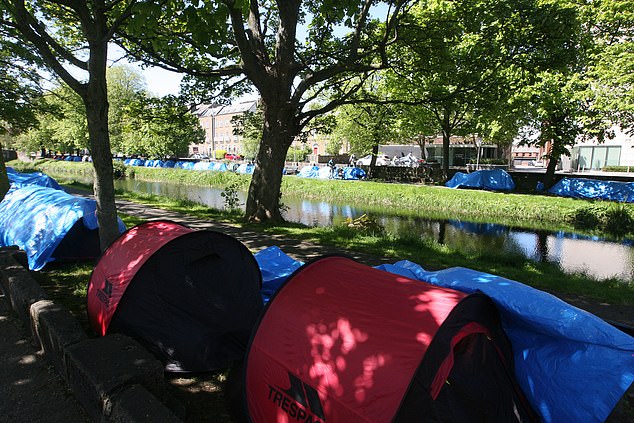
During just three days, an estimated 200 migrants are believed to have crossed into the Republic of Ireland in the same week. Pictured: asylum seekers tents seen on the Grand Canal bank at Warrington Place in Dublin in May 2024
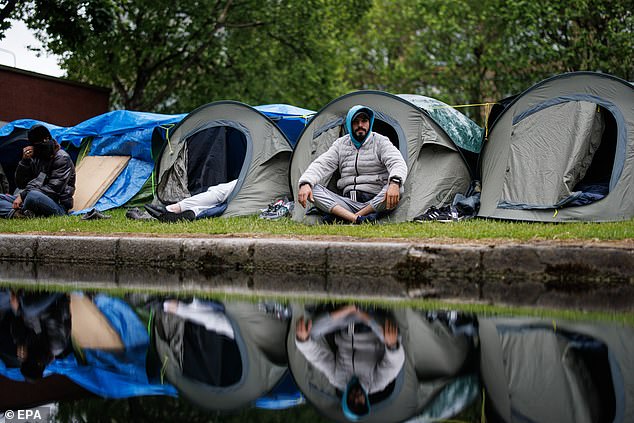
A makeshift camp where homeless asylum seekers sleep rough in tents along the Grand Canal in Dublin
During just three days, an estimated 200 migrants are believed to have crossed into the Republic of Ireland in the same week.
Meanwhile, up to 1,002 asylum applications were lodged at Dublin’s IPO, with government officials estimating that up to 90 per cent would have travelled from Britain via Northern Ireland.
Detective Chief Superintendent Aidan Minnock, leader of GNIB, told The Times that many who cross the border have been lured in by online ads promising work that subsequently become exploited by criminal trafficking gangs that demand large sums of money.
The Home Office said: ‘This government is committed to taking down the criminal gangs who exploit vulnerable people in order to make quick cash, and we work closely with Ireland to support them on border security.
‘This includes a joint commitment to protect the Common Travel Area (CTA) from abuse, which is delivered through joint work to identify and tackle illegal migration trends as they emerge.’
GNIB said: ‘There is extensive engagement, and cooperation at all levels between officials in the Department of Justice, Home Affairs and Migration and Home Office counterparts, as well as significant operational cooperation between the Gardaí, UK Border Force, UK policing services and the Police Service of Northern Ireland in relation to both immigration and criminal matters.
‘This strong practical engagement and cooperation serves the mutual interests of both Ireland and the UK, and will continue.’
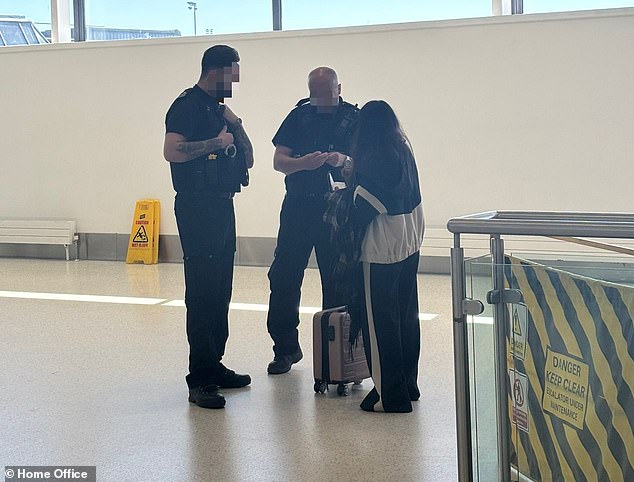
In May, more than 30 people were arrested and £17,000 of suspected criminal assets seized in a people-smuggling crackdown in Northern Ireland
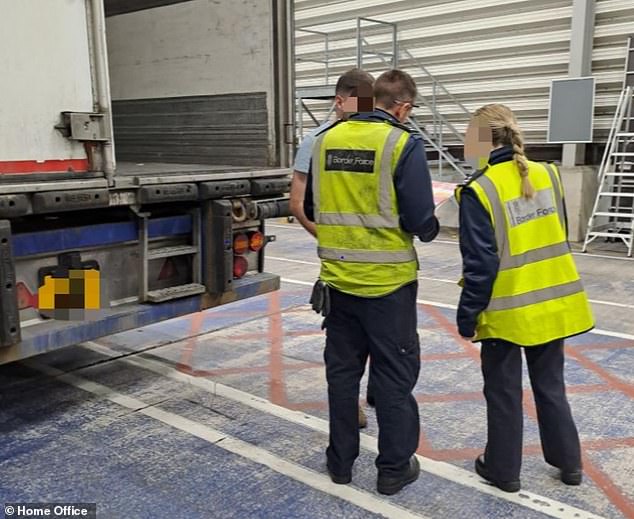
The arrests of 33 illegal migrants and suspected people smugglers were part of a three-day operation to tackle criminals exploiting the CTA at ports and airports in Northern Ireland, north-west England and Wales
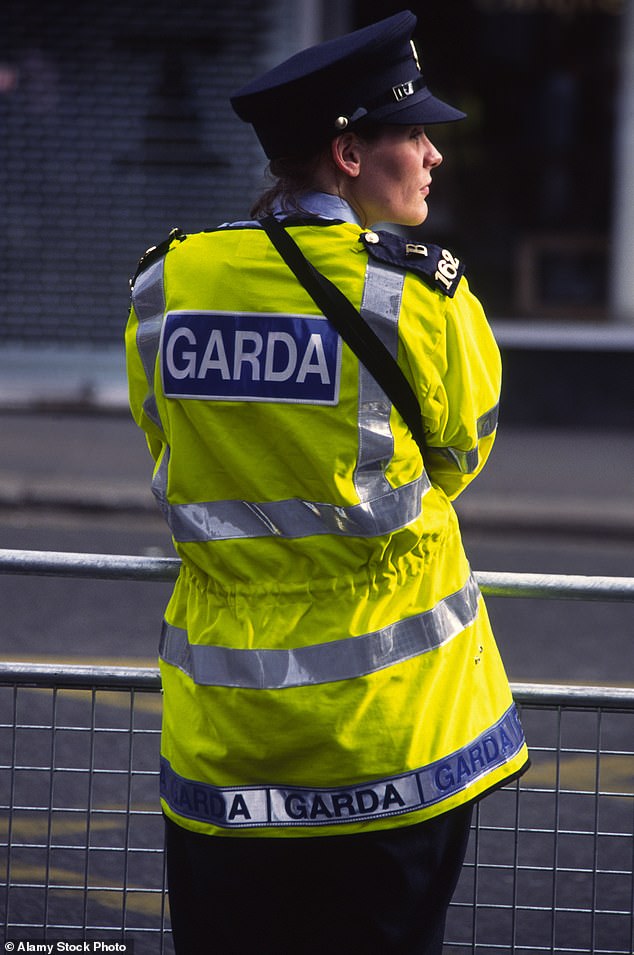
Inquiries into another asylum seeker removed from a bus, named Hassan, revealed that he had applied for British refugee status and was working in the UK while visiting Ireland weekly to collect welfare funds (file image)
The UK shares a Common Travel Area (CTA) with Ireland, which was first implemented in 1923, well before either country joined the EU which has its own freedom of movement rules.
In May, more than 30 people were arrested and £17,000 of suspected criminal assets seized in a people-smuggling crackdown in Northern Ireland.
A lorry related to an unpaid penalty notice over stowaways, worth £144,000, was also confiscated by officers.
The arrests of 33 illegal migrants and suspected people smugglers were part of a three-day operation to tackle criminals exploiting the CTA at ports and airports in Northern Ireland, north-west England and Wales.
It is the sixth operation of its kind, working between the Police Service of North Ireland, An Garda Siochana, the National Crime Agency, other UK police forces, Border Force and international partners.
The Home Office said 60 arrests had been made and more than £405,000 of criminal cash seized, over abuse of the CTA, since Labour took power in July last year.
Routes from the island of Ireland to the UK mainland have long been feared to be susceptible to people smuggling due to minimal border controls in the zone.
Last year, 14 Albanians were found hiding inside a livestock wagon that had travelled into the British mainland from Northern Ireland.
Officials confirmed the arrest was made at Loch Ryan ferry port in Dumfries and Galloway, 80 miles south of Glasgow.
Illegal migrants are also known to have exploited the lack of a hard border between the Republic of Ireland and Northern Ireland.
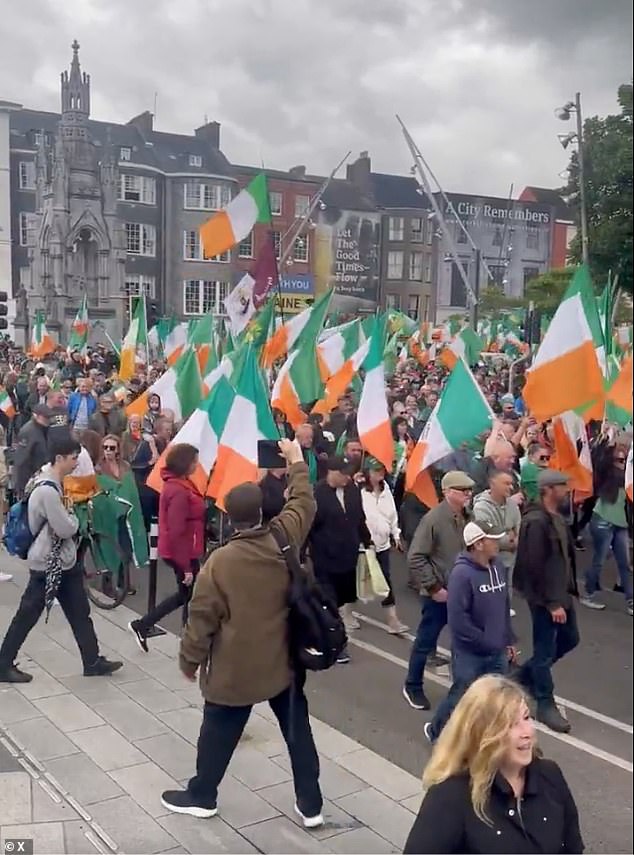
Pictured: in May, 3,000 people joined an anti-immigration rally organised by Ireland Says No – which attendees said signalled a feeling in the country that ‘enough is enough’
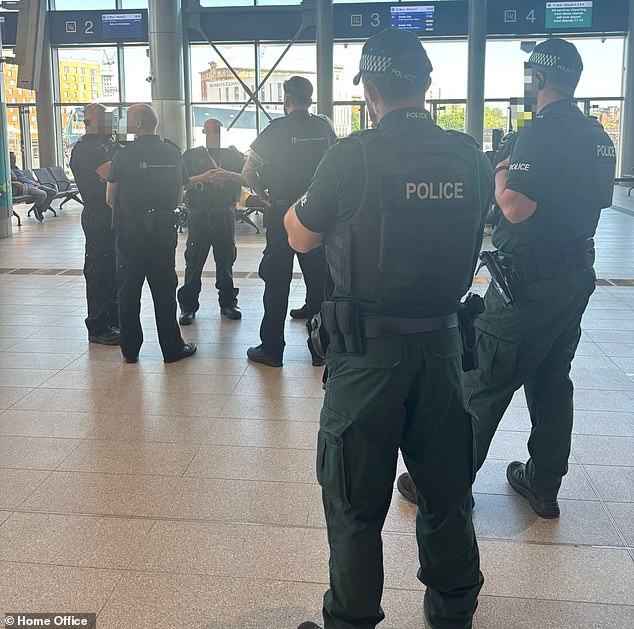
Routes from the island of Ireland to the UK mainland have long been feared to be susceptible to people smuggling due to minimal border controls in the common travel area
Home Office immigration enforcement deputy director Ben Thomas said: ‘Criminal networks seek to bypass robust border checks through fraudulent means and trap vulnerable people into further illegal activities.
‘The success of this operation marks a significant step up in enforcement activity, leading to the arrest of 33 criminals who attempted to abuse the common travel area and undermine the UK’s border security.’
In May last year, a poll revealed that half of the Irish public would like migrant checkpoints at the border with Northern Ireland to slow the number of asylum seeker arrivals from Britain.
Fifty per cent of respondents told the Sunday Independent and Ireland Thinks they would support checkpoint measures to limit the number of asylum seekers arriving from Britain, with 82 per cent backing deportations back to the UK.
With tented communities continuing to grow in Dublin, as many as 40 per cent of poll respondents added that they would support Ireland having a policy similar to Britain’s Rwanda scheme – with 42 per cent opposing the measures.
The Irish Garda were approached for comment.












